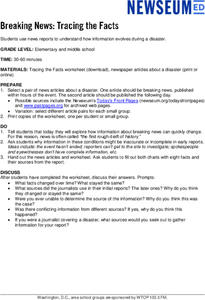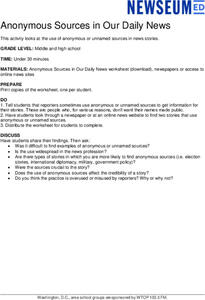Newseum
Free Press Challenges Through History: Analyzing Historical Sources
The debate over the integrity of stories in media is not new. Young journalists analyze historical sources that reveal freedom of the press controversies and draw parallels to challenges freedom of the press faces today.
Newseum
Covering a Catastrophe: Press Conference Simulation
Young journalists have an opportunity to experience the challenges of covering a catastrophe by staging a mock press conference. Half the class acts as reporters while the others act as officials from the mayor's office.
Newseum
Breaking News: Tracing the Facts
Breaking news reports can be short of facts. Young journalists select a pair of news articles about a disaster; one published within hours of the event and the second published the following day. They examine whether facts in the report...
Facebook
What Is Verification?
One of the most important skills news consumers and social media users must develop is the ability to determine the veracity of stories they read or view. Here's an interactive lesson plan that teaches high schoolers how to verify news...
Facebook
The Verification Steps
Provenance, source, date, location, and motivation. High schoolers learn how to verify the authenticity of news stories and posts by following a seven-step process. They then use the strategy to determine the original site that posted a...
Facebook
Versions of Media Texts
Verification of provenance and the original source of an image or video can be a long and winding process. Young journalists learn about the difficulty of finding the original source of a scrape, a copy of an original news story, and...
Facebook
Metadata
In previous lessons, young journalists learned about how to trace the original source of scrapes and memes. This interactive lesson plan teaches them another important step in the verification process. Participants learn how to analyze...
Franklin D. Roosevelt Presidential Library & Museum
What Does It Mean to Be an American?
A series of four activities focuses young scholars' attention on what it means to be an American. They identify key qualities, values, and virtues they consider shared by Americans. Participants then pretend they have been selected to...
National Endowment for the Humanities
Themes in Lord of the Flies
William Golding's Lord of the Flies is the anchor text for a lesson plan that teaches readers how to distinguish between a literary topic and a literary theme. Using the provided worksheets, groups first chart some themes and propose a...
National Endowment for the Humanities
Man and Superman
Ordinary and extraordinary readers will find much to contemplate in a lesson on Crime and Punishment as they examine the dichotomies in Dostoevsky's novel. Scholars reflect on Raskolnikov's theory that extraordinary individuals are not...
Newseum
Is It Fair?
Young journalists learn how to analyze word choice, context, and counterpoints to judge the fairness of a news story. They practice using these tools to judge a series of headlines for the story of Goldilocks and the Three Bears. They...
Nebraska Department of Education
This I Believe
As part of a Career Develop unit, eighth-graders reflect on their beliefs and values and consider how these beliefs might affect their relationships with friends and with colleagues when they join the workforce.
Overcoming Obstacles
Developing Personal Power
The final lesson in the series teaches participants that they can use their personal power to bring about positive change. The class engages in a series of activities that reveal the kinds of personal power they have, including the power...
Nebraska Department of Education
The Five Things
High school freshmen consider how their resources and values can support them in their future goals by answering questions such as; What do you value? What do you enjoy doing? What do you do well? Of what accomplishments are you...
Newseum
Bias Through History: Analyzing Historical Sources
Young journalists use the E.S.C.A.P.E. (evidence, source, context, audience, purpose, and execution) strategy to evaluate historical and contemporary examples of bias in the news. The class then uses the provided discussion questions to...
Newseum
The Press and the Presidency: Friend or Foe? How the President Is Portrayed
In theory, news reports should be fair and unbiased. Young journalists test this theory by selecting a current news story covered by various media outlets about the President of the United States. They then locate and analyze five...
Newseum
Anonymous Sources in Our Daily News
Young journalists search for two examples of news stories, either published or online, that use anonymous or unnamed sources. They then consider the possible motives for why the sources remain unidentified, the types of stories that use...
Newseum
You Can’t Say That: Right to Know vs. Security Risk
Print or block? That is the question young journalists debate as part of their study of the freedom of the press. Half the class represents the journalists' legal team, and the other half represents the government's legal team. Teams...
Penguin Books
A Teacher's Guide to the Signet Classics Edition of Walden and "Civil Disobedience" by Henry David Thoreau
According to Henry David Thoreau, every citizen must object to unjust laws. The teacher's guide to Thoreau's "Civil Disobedience" begins with a detailed essay synopsis to help readers understand Thoreau's rationale in the challenging...
Overcoming Obstacles
Speaking
Words! Words have meaning and power, and using them leads to consequences. The activities in this lesson are designed to remind participants to choose their words wisely when they speak.
Overcoming Obstacles
Playing by the Rules
The takeaway from the "Playing by the Rules" instructional activity is that it is each person's responsibility to learn the rules in a given situation and that they must accept the consequences if they choose not to follow the stated...
K20 LEARN
The K20 Chronicle, Lesson 2: How To Conduct An Interview
Young journalists learn how to prepare for an interview, conduct an interview, and craft good interview questions with follow-up questions. After they watch and analyze several interviews, class members select a senior to interview,...
K20 LEARN
No Imitations, Please! Avoiding Plagiarism
With all the stuff available online, good essays are just a click away. But talk about tracking! Writers beware! New tech can now identify plagiarism, and the consequences of presenting someone else's work as your own are severe. Here's...
Curated OER
Reformation Simulation
Students discover the Medieval reformation. For this ethics lesson, students simulate council and government bodies to determine responses to various opinions regarding religion and ethics. They determine what postilions to take and why...
Other popular searches
- Business Ethics
- Work Ethics
- Computer Ethics
- Medical Ethics
- Morals and Ethics
- Ecology Ethics
- Code of Ethics
- Values and Ethics
- Environmental Ethics
- Public Speaking Ethics
- Psychology Ethics
- Ethics and Science

























